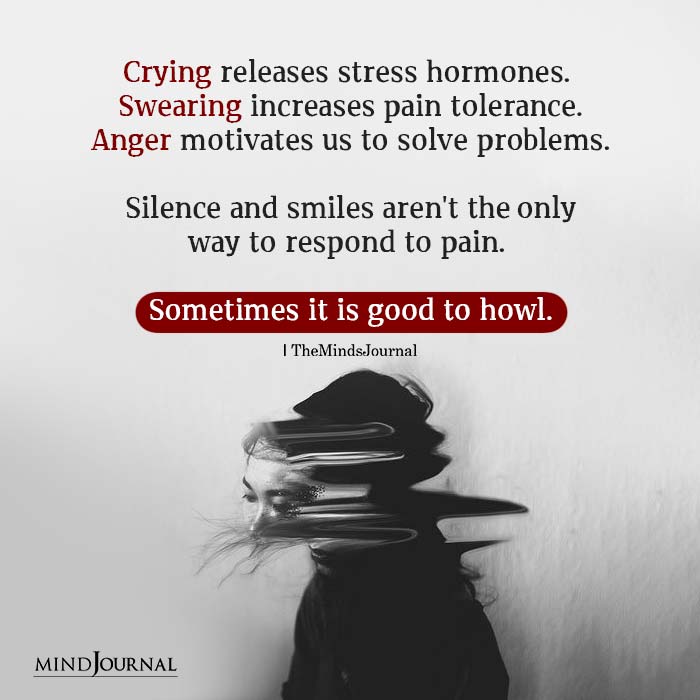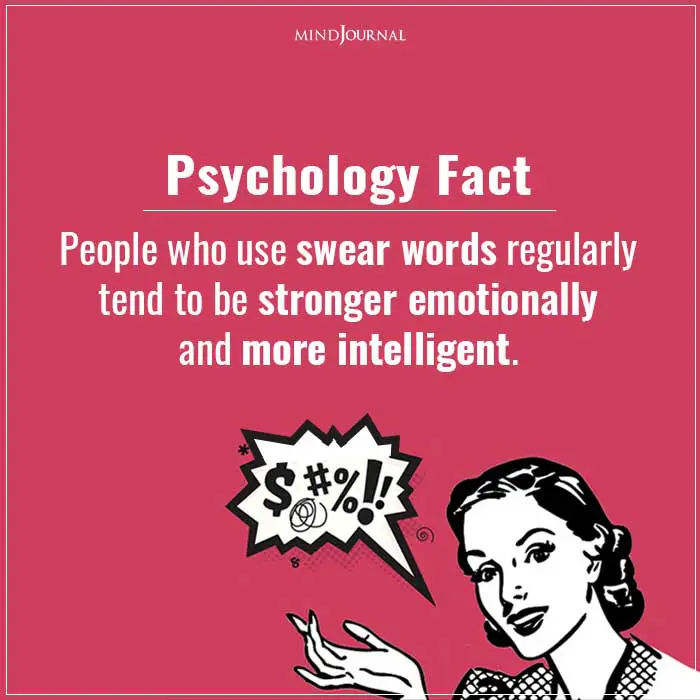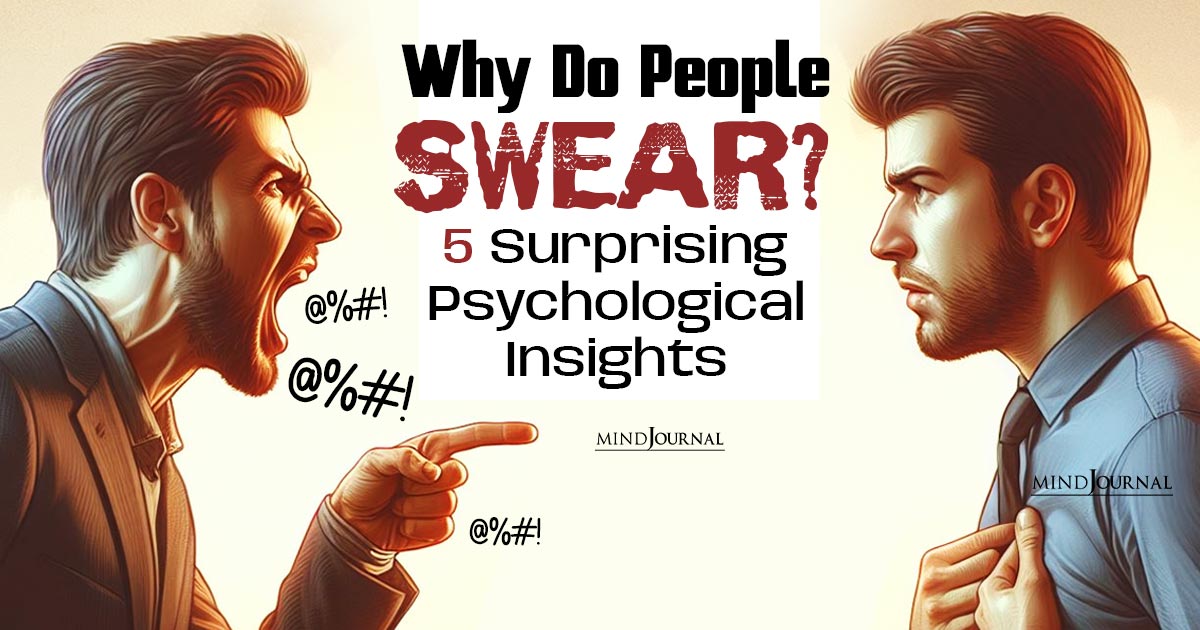Have you ever found yourself swearing in a moment of anger, stress or frustration? Ever wondered why some people seem more likely to swear, while others hardly ever use a bad word? Let’s explore the psychology of why do people swear.
[Bleep, Bleep, Bleep]
Swearing has always been an interesting aspect of human behavior that has fascinated psychologists for decades. Today we will dive into the psychology of swearing and understand traits of people who swear a lot, benefits of swearing, how do you stop cursing and is swearing good for your mental health.
So let’s get started!
The Psychology of Swearing
Swearing or using offensive language is a complicated behavior that is affected by various psychological factors. But why do people swear? One reason people commonly use profanity is emotional expression.

When we experience strong emotions like anger, frustration, pain, or surprise, we often use cursing and swearing as a pressure valve to vent out and let go of stress, anxiety and tension.
By using cuss words, we manage to verbally express our innermost feelings in an unfiltered manner, which offers temporary relief & a sense of catharsis.
Related: Science Says People Who Swear More Have Superior Intelligence
Why Do People Swear?
People swear due to different reasons and these are five common reasons why profanities are used:
1. Emotional Expression
People use swear words when they want to convey intense emotions such as anger, frustration or pain in its rawest form. It helps them experience temporary relief by letting out pent-up emotions.
2. Catharsis
Sometimes cursing can act as a cathartic & therapeutic tool that can help individuals experience emotional release from stressors and difficult experiences. It helps them let out steam, reducing emotional strain.
3. Social Bonding
Profanity promotes social bonding and camaraderie among friends. It enhances group identity and shared experiences creating feelings of belongingness and solidarity.
4. Communication Intensity
More than anything else, using bad language changes speech patterns by adding emotional intensity to one’s words. It can make the content more provocative either by highlighting certain points with much emphasis or making communication more interesting & persuasive in particular settings.
5. Habit and Cultural Influence
Often, swearing becomes part of a person’s language that becomes habitual as it is strongly influenced by cultural practices and social settings. In case someone’s social circle or community has many individuals who swear casually, the person may adopt it in his vocabulary.
Traits of People Who Swear a Lot
People who swear often may have certain traits in common. These include –
- Higher risk-taking tolerance
- Increased impulsivity
- Lower levels of agreeableness
Swearing can also be seen as a dominant & assertive communication style with more emphasis and authority depending on speaking position. It can be used to express power, establish authority, or gain attention
Nevertheless, it’s worth mentioning that these attributes are not exhaustive and those people who excessively swear might still have diverse personalities.
Now that we know why do people swear and the traits of people who swear a lot, let’s find out the benefits of swearing and how do you stop cursing.
Related: Highly Intelligent People Are Messy, Swear A Lot, and Stay Up Late, Says Science
Benefits of Swearing

Despite popular belief, swearing has some advantages in specific circumstances. Primarily, it can be used as a coping mechanism for dealing with stress and reducing emotional pain.
Moreover, it improves connection and bonding among friends and peers and helps to create a sense of group identity & shared experiences. It also gives more strength and emotions to a speech, which makes it look more convincing in some cases.
However, swearing must be applied with great caution and its relevance must be assessed.
How Do You Stop Cursing?
If you swear too much and wish to stop doing so there are several approaches you may adopt. The first involves developing self-awareness.
This means being mindful of the situations or triggers that make you curse and finding healthier ways through which you could communicate your feelings better in such situations.
Furthermore, relaxation techniques such as deep breathing or meditation can help you control stress, reducing the temptation to swear. Surrounding yourself with positive and optimistic individuals and being determined to stop using profanity in the long run can also prove beneficial.
Is Swearing Good for Your Mental Health?
There is no clear consensus on the impact of swearing on mental health and it is a topic of debate among researchers.
Although there has been some evidence suggesting that cursing could be therapeutic as it helps to reduce pain and increase emotional resilience, the research is limited. Cussing might bring temporary relief but relying solely on it to express and manage your emotions may prevent the development of other healthier coping mechanisms.
It is crucial that you explore other strategies such as seeking social support, practicing self-care techniques, and engaging in activities that increase emotional well-being
Takeaway
Swearing is a complex and multifaceted facet of human behavior with several psychological functions. It can act as a release valve for intense emotions and make communication more expressive while promoting social bonds among people.
However, cursing and swearing can also have negative consequences and prevent the development of healthier coping mechanisms. By understanding the psychology of swearing, why do people swear, traits of people who swear a lot, benefits of swearing, and how do you stop cursing, you can become more aware of your choices in communicating and maintaining your mental health.
Remember to find a middle ground between expressing yourself positively and being considerate towards others. So the next time you get that urge to use foul language just pause and think if there is a better way you could have expressed yourself.
Related: 9 Surprising Benefits Of Bad Habits: The Lazy Person’s Guide
Frequently Asked Questions (FAQs):
What is the reason for swearing?
Swearing and cursing helps with unfiltered emotional expression, stress relief, and social connection, and is caused by complex psychological and cultural factors.
What does swearing say about a person?
It can show authenticity, emotional intensity, or a relaxed communication style, depending on the situation and context.
Why do people use the F word so much?
Frequent use of the F-word may indicate emphasis, habit, or cultural influence, reflecting personal expression and norms.









Leave a Reply
You must be logged in to post a comment.